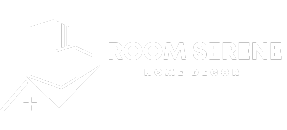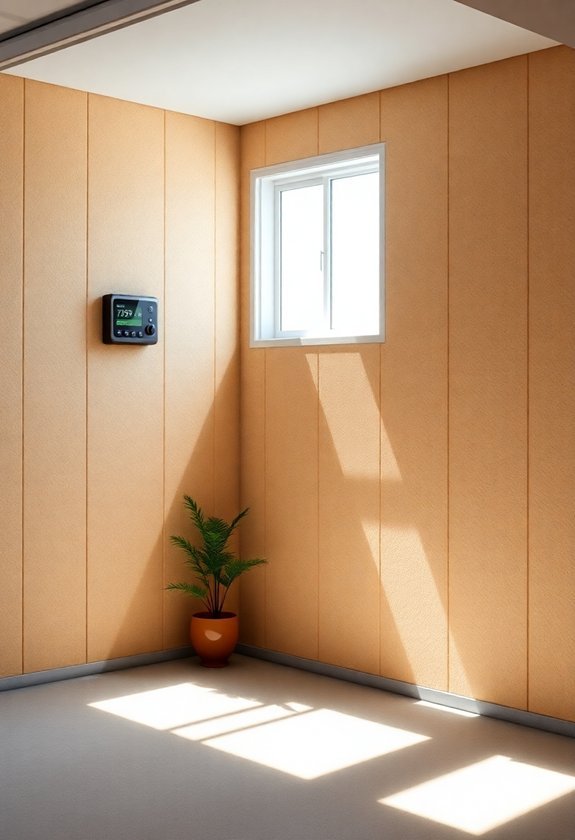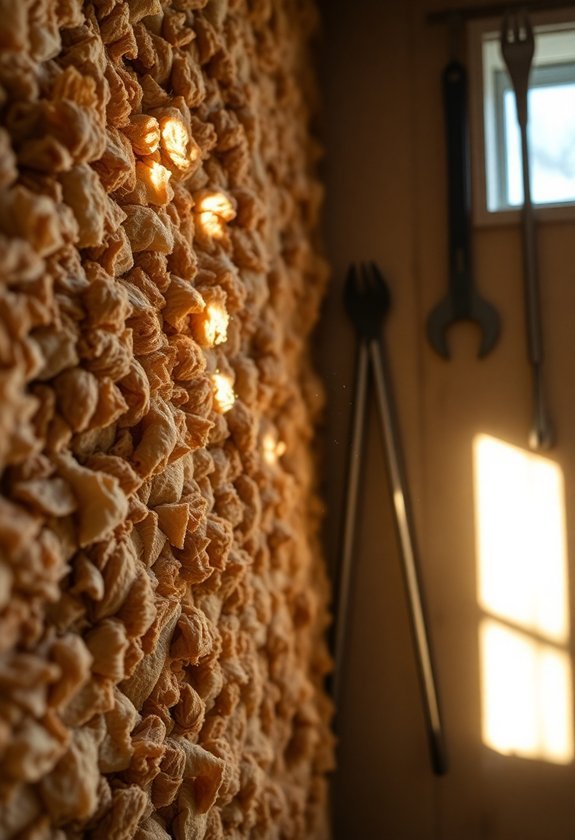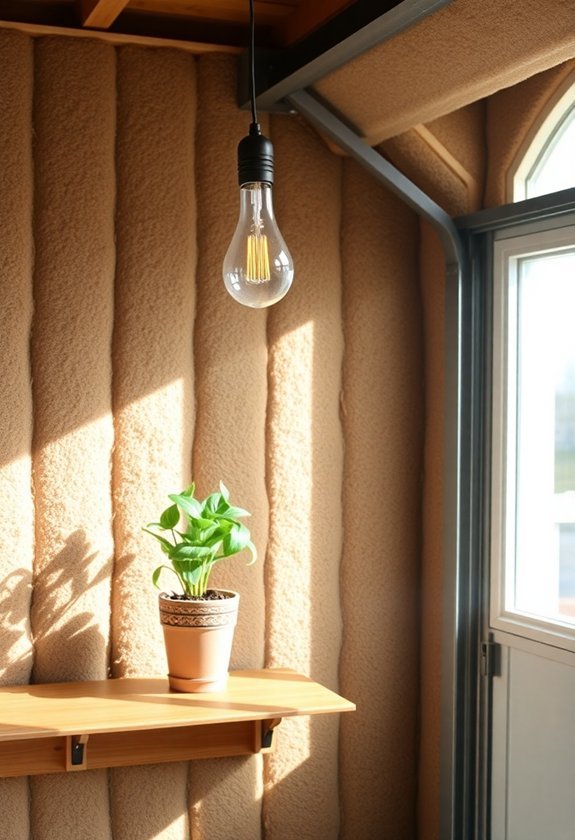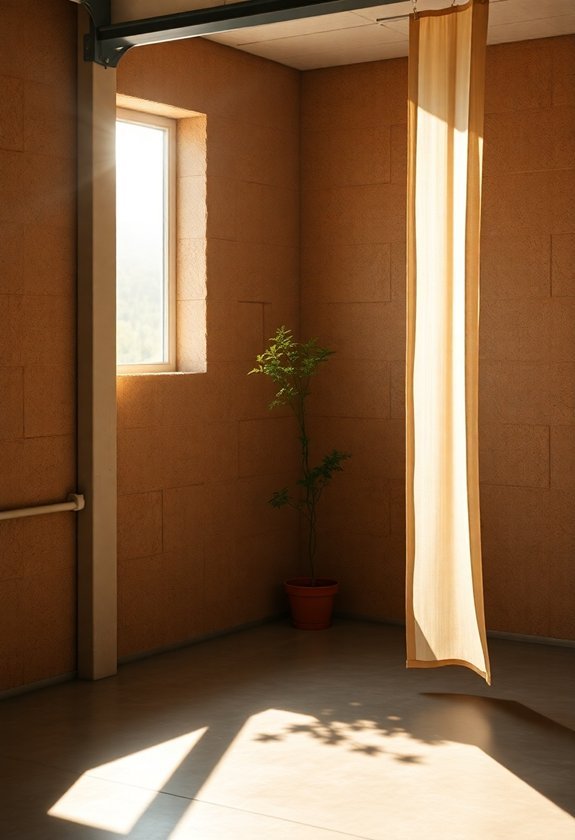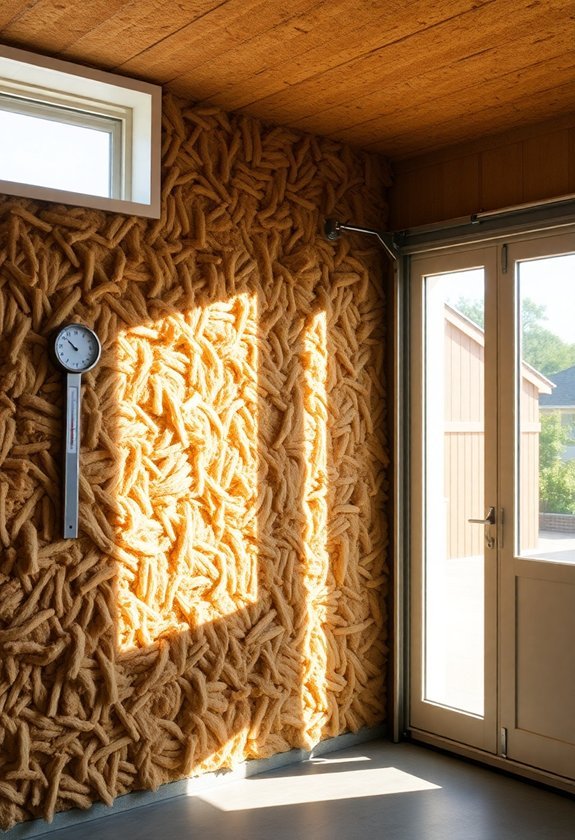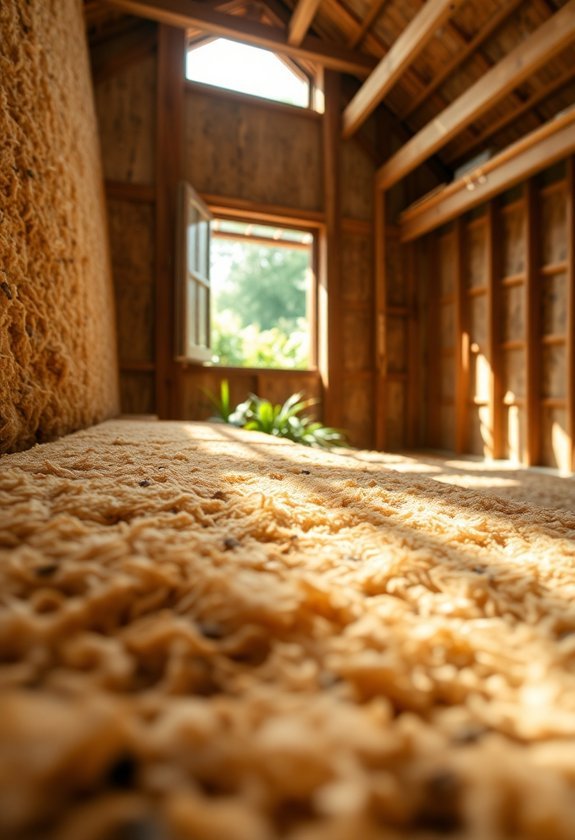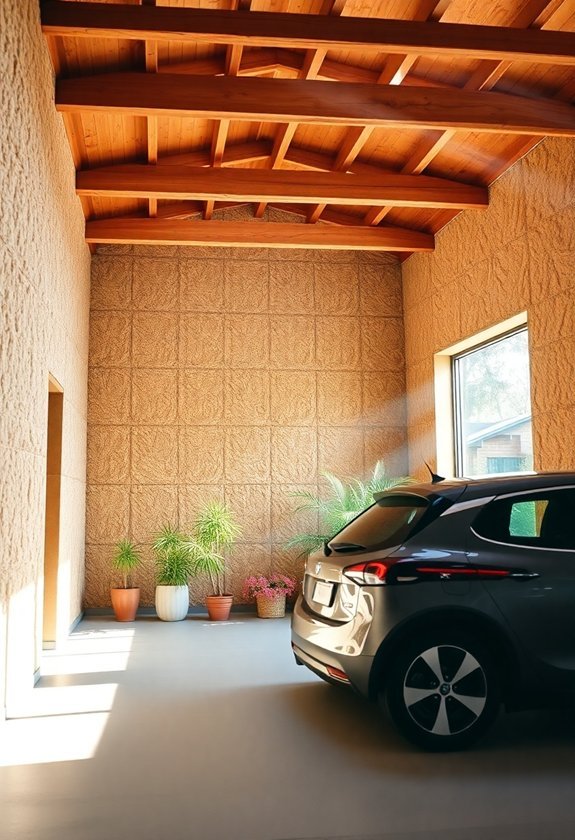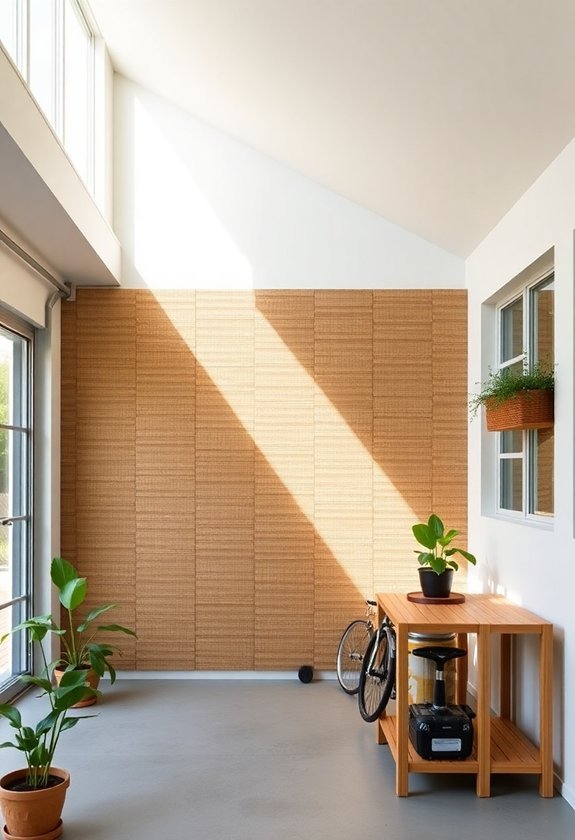This post may contain affiliate links. Please read our policy page.
Using natural fibers in your garage boosts energy efficiency considerably. You can enjoy savings of up to 20% on energy costs, thanks to their excellent thermal resistance and temperature regulation. Natural fibers, like wool and hemp, also help manage humidity, reducing mold and protecting air quality. They're eco-friendly, with a lower carbon footprint compared to synthetic alternatives, and they last longer, saving on replacements. By investing in these materials, you're choosing sustainability without sacrificing comfort. Explore how natural fibers transform your garage into an energy-efficient space that aligns with your values and practical needs.
Design Highlights
- Natural fiber insulation can reduce energy bills by up to 20%, providing significant cost savings for garage spaces.
- These materials enhance thermal resistance and effectively regulate humidity, improving overall comfort and reducing heating and cooling needs.
- Eco-friendly natural fibers have a lower carbon footprint and require less energy during manufacturing compared to synthetic materials.
- Natural fibers improve indoor air quality by regulating moisture and preventing mold growth, contributing to a healthier garage environment.
- Their durability and longevity minimize the need for replacements and repairs, leading to further cost savings over time.
Cost Savings on Energy Bills
Reducing energy bills starts with smart choices in your garage, and using natural fibers for insulation is a game-changer. By opting for materials like cellulose, cotton, or wool, you're making a cost-effective investment that pays off in the long run. These natural fibers not only provide excellent thermal resistance but also help maintain a stable temperature in your garage, which can lead to significant savings on your energy bills.
When you insulate with natural fibers, you're minimizing the amount of energy needed to heat or cool the space. This means your heating system won't have to work as hard during the winter, and your air conditioning will be more efficient during the summer. Consequently, this reduction in energy consumption translates directly into lower utility bills. In fact, studies show that homeowners can save up to 20% on their energy costs by improving insulation.
Moreover, natural fibers are often more affordable than synthetic alternatives. With rising energy prices, the initial investment in natural fiber insulation will likely yield a quicker return on investment. You're not just saving on energy bills; you're also contributing to a more sustainable environment by choosing eco-friendly materials.
Additionally, natural fibers have the added advantage of being non-toxic and free from harmful chemicals, ensuring a healthier environment for you and your family. Furthermore, many eco-friendly storage solutions incorporating natural fibers can enhance your garage's overall functionality and organization with space-saving designs. By making this smart choice for your garage, you're paving the way for a more energy-efficient home and enjoying the benefits of lower bills for years to come.
Superior Insulation Properties
When it comes to insulation, natural fibers shine with their superior properties that outperform many synthetic materials. You'll find that materials like wool, cotton, and hemp provide excellent thermal resistance, effectively keeping your garage comfortable throughout the year. Unlike synthetic insulations, which can lose effectiveness over time, natural fibers maintain their insulating capabilities, ensuring your garage stays warm in winter and cool in summer.
One of the standout features of natural fiber insulation is its ability to regulate humidity. This is essential in garages where moisture can lead to mold and mildew growth. By absorbing excess moisture, these fibers help create a healthier environment, protecting both your belongings and the structural integrity of your garage.
Moreover, the air pockets within natural fibers enhance their insulating properties. This unique structure allows for better soundproofing, which is especially beneficial if your garage doubles as a workspace or hobby area. You can enjoy a quieter environment without the constant noise from outside. Furthermore, using eco-friendly materials not only supports sustainability but also contributes to a healthier living space.
Eco-Friendly Material Options
Choosing eco-friendly material options for your garage not only benefits the environment but also enhances energy efficiency. By selecting sustainable materials, you can greatly reduce your carbon footprint and create a more energy-efficient space. Natural fibers, such as hemp, wool, and cotton, are excellent choices that provide insulation without the harmful chemicals often found in synthetic options.
Hemp, for instance, is not only highly renewable but also boasts impressive thermal properties. Its structure traps air, providing effective insulation while helping regulate temperature fluctuations. Wool is another fantastic option; it can absorb and release moisture, which helps maintain a stable environment in your garage. Additionally, cotton insulation, made from recycled materials, is biodegradable and safe, making it a responsible choice for conscientious homeowners.
Using these eco-friendly materials can also lead to long-term savings on energy bills. By improving insulation, you reduce the need for heating and cooling, which translates to lower energy consumption. In addition, many natural fibers are durable and require less maintenance over time, saving you money on repairs or replacements.
When you choose eco-friendly material options for your garage, you're investing in a healthier living space and a sustainable future. With these materials, you not only enhance your garage's energy efficiency but also contribute positively to the environment. Furthermore, incorporating natural fiber solutions can improve indoor air quality by minimizing the presence of harmful pollutants. Make the switch today and experience the benefits that come with natural, sustainable materials.
Improved Air Quality
Many homeowners overlook the impact of their garage's air quality on overall health and well-being. It's easy to dismiss the garage as just a storage space for tools and cars, but the air quality in this area can greatly affect your indoor environment. Natural fibers, like hemp or cotton, can play an essential role in enhancing that air quality.
Using natural fibers in your garage insulation or wall coverings can help regulate humidity levels. These materials are breathable, allowing moisture to escape rather than trapping it. This is important because stagnant moisture can lead to mold growth, which poses serious health risks for you and your family. By reducing mold spores in the air, you're actively improving the air quality in your home.
Additionally, natural fibers tend to emit fewer volatile organic compounds (VOCs) compared to synthetic alternatives. VOCs are known to aggravate respiratory issues and can lead to long-term health problems. When you opt for natural materials, you're not just insulating; you're also creating a healthier environment.
Furthermore, natural fibers often possess inherent antimicrobial properties, providing an extra layer of protection against bacteria and allergens. This means that the air you breathe in your garage—and ultimately throughout your home—can be cleaner and safer. Moreover, incorporating organic cotton into your space can complement your overall commitment to eco-friendly storage solutions, ensuring that your environment remains both sustainable and healthy.
Temperature Regulation Benefits
Improving air quality in your garage is just one aspect of how natural fibers can enhance your home's efficiency; they also offer significant temperature regulation benefits. When you choose natural fibers like wool, cotton, or hemp for insulation, you're not just opting for eco-friendliness—you're making a smart decision for temperature control.
Natural fibers possess outstanding thermal properties. They can help you maintain a stable temperature within your garage, reducing the need for additional heating or cooling. This stability means your garage stays cooler in the summer and warmer in the winter, ultimately leading to lower energy bills. You'll notice that by using these materials, your garage becomes a more comfortable space for any activities you may engage in.
Moreover, these fibers absorb moisture, which prevents the buildup of humidity that can lead to temperature fluctuations. This moisture management creates an environment where temperatures remain consistent, reducing stress on your HVAC system. You'll find that a well-insulated garage with natural fibers provides a buffer against the external temperature extremes.
Incorporating natural fibers into your garage's insulation not only keeps the space comfortable but also minimizes energy consumption. This means you're not just saving money; you're contributing to a more sustainable lifestyle. By investing in natural fiber insulation, you're making a choice that positively impacts both your wallet and the environment. Additionally, using organic cotton products can enhance your garage's insulation performance even further. Consider how these benefits can transform your garage experience.
Durability and Longevity
Natural fibers not only provide excellent temperature regulation but also stand out for their durability and longevity. When you choose natural fibers for your garage, you're investing in materials that withstand the test of time. Unlike synthetic options that may degrade or wear out quickly, natural fibers, such as hemp, jute, and cotton, maintain their structural integrity even in varying temperatures and humidity levels.
These fibers are inherently resistant to mold and mildew, which is essential in a garage environment where moisture can be problematic. This resistance not only enhances the lifespan of the materials but also reduces the need for frequent replacements or repairs, saving you money in the long run. Additionally, natural fibers possess excellent tensile strength, meaning they can bear weight and resist tearing or fraying, making them ideal for garage applications.
You might also appreciate that natural fibers offer a level of flexibility and adaptability that synthetic materials often lack. They can easily conform to different shapes and spaces, ensuring a snug fit that maximizes energy efficiency. Furthermore, utilizing recycled wood products in conjunction with natural fibers can enhance your garage's overall eco-friendliness.
Reduced Carbon Footprint
Choosing natural fibers for your garage not only enhances energy efficiency but also markedly reduces your carbon footprint. When you opt for materials like hemp, jute, or cotton, you're making a conscious choice that reflects your commitment to sustainability. Unlike synthetic fibers, which are derived from petroleum and require extensive energy for production, natural fibers are renewable and typically involve lower energy consumption during manufacturing.
By using natural fibers, you're also supporting sustainable agricultural practices. Many of these fibers are grown without harmful pesticides or fertilizers, which contributes to healthier ecosystems. This means less soil degradation, reduced water pollution, and a smaller carbon footprint associated with crop production. You're not just insulating your garage; you're actively participating in a cycle that prioritizes environmental health.
Moreover, natural fibers are biodegradable. When they eventually reach the end of their life cycle, they break down naturally, unlike synthetic options that linger in landfills for decades. This reduces waste and minimizes the environmental impact of your garage renovations.
Investing in natural fibers is an opportunity to align your home improvement choices with your values. You're not merely making a decision for today; you're contributing to a more sustainable future. By lowering your carbon footprint through the use of natural fibers, you're setting an example for your community, encouraging others to contemplate eco-friendly alternatives. In a world increasingly focused on sustainability, your choice can inspire change and foster a healthier planet for generations to come. Additionally, utilizing eco-friendly storage solutions can further enhance the sustainability of your living space.
Versatile Applications in Garages
Transforming your garage into a multifunctional space is easier than you might think, especially when you incorporate natural fibers. These materials have a wide range of applications that can enhance both functionality and energy efficiency in your garage. For instance, consider using natural fiber insulation. It's not only effective in regulating temperature but also helps reduce energy costs, making your garage more comfortable year-round.
You can also explore natural fiber flooring options, like sisal or jute rugs. These not only provide a warm and inviting atmosphere but also improve traction, making your garage safer. By choosing breathable materials, you're reducing the risk of mold and musty odors, which is essential in a space where you might store equipment or vehicles.
Natural fibers can also be utilized in storage solutions. Think about using wicker baskets or cotton canvas bins to keep your garage organized. They're durable, stylish, and eco-friendly, allowing you to declutter while contributing to a sustainable environment. Additionally, opting for bamboo storage solutions can further enhance your garage's organization while promoting an eco-friendly lifestyle.
Moreover, if you're thinking about workspace areas, natural fiber fabrics for curtains or partitions can help create distinct zones without sacrificing aesthetics. They allow for natural light while providing privacy, making your garage a pleasant area for DIY projects or hobbies.
Incorporating natural fibers in your garage isn't just about aesthetics; it's a strategic choice that enhances energy efficiency and versatility. By choosing these materials, you're not only making your garage more functional but also embracing an eco-conscious lifestyle.

